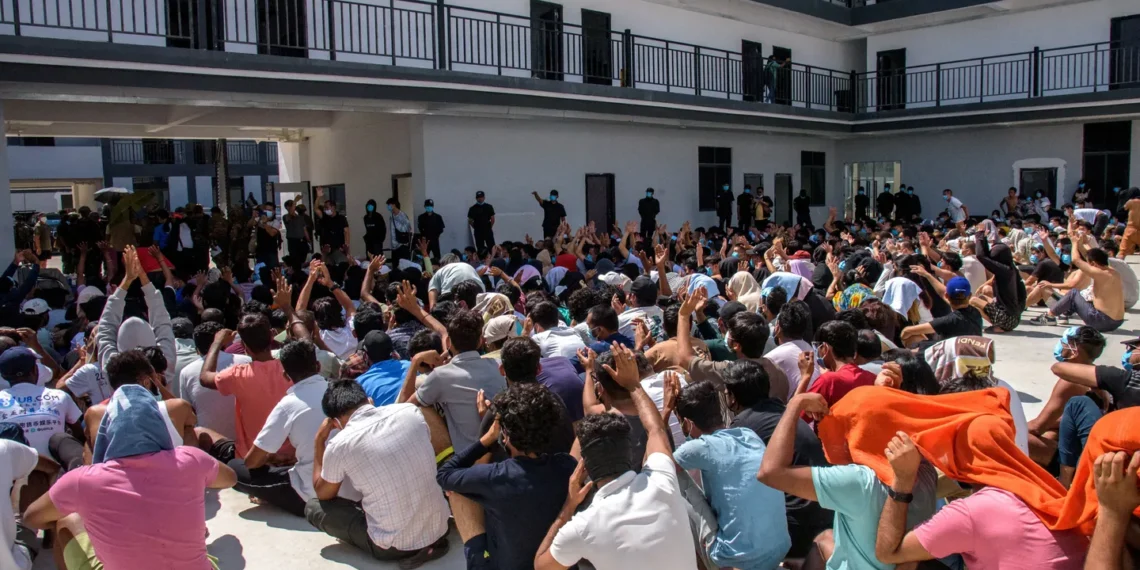India will repatriate around 500 citizens trapped in Thailand’s Mae Sot after Myanmar’s military assault on the KK Park cyber-scam complex forced thousands to flee across the border.
By PC Bureau
October 29, 2025: India is preparing to repatriate around 500 of its citizens stranded in Thailand’s border town of Mae Sot following Myanmar’s military crackdown on the notorious KK Park cyber-scam complex, Thai Prime Minister Anutin Charnvirakul announced on Wednesday.
The operation will involve a special Indian aircraft landing directly at Mae Sot airport, marking New Delhi’s latest effort to rescue citizens trapped in Southeast Asia’s expanding web of online fraud hubs amid Myanmar’s worsening civil war.
Thai authorities said the wave of people fleeing the conflict zone has dropped sharply, with only a few stragglers crossing the Moei River in recent days. Between October 22 and 28, more than 1,500 people — mostly foreign nationals from 28 countries — fled into Thailand’s Tak province. Among them were nearly 500 Indians, many believed to be trafficking victims duped by fake job offers.
“India has sought our cooperation to avoid burdening us,” Anutin said in Bangkok. “They will send a plane to pick up these victims directly from Mae Sot.”
India prepares to repatriate 500 citizens from Thailand after raids on a Myanmar scam hub forced workers to flee across the borderhttps://t.co/1d4IjUVlxw
— TRT World (@trtworld) October 29, 2025
Raid on KK Park: Explosions, Exodus, and Chaos
Myanmar’s junta began operations against KK Park — a 50-hectare cyber-scam complex in Myawaddy township, Karen State — in early September, intensifying in mid-October. The compound, run by Chinese criminal syndicates and guarded by pro-junta militias, had long been a hub for online fraud, crypto scams, and human trafficking.
State media reported over 2,000 arrests and the seizure of at least 30 Starlink terminals used to power scam networks. On October 25, the military and the Border Guard Force launched explosions that demolished parts of the facility, sending plumes of white smoke visible across the Thai border, according to AP footage.
The raids triggered a mass escape, with hundreds of workers swimming across the rain-swollen Moei River or using small boats. Several reportedly drowned in the strong currents. Thai authorities have since set up temporary shelters in Mae Sot to process arrivals, distinguishing victims from perpetrators. The refugees include citizens from China, the Philippines, Vietnam, Ethiopia, Kenya, and Thailand itself.
By Tuesday, Thailand’s Naresuan Task Force confirmed that the flow had “slowed to a trickle.” However, independent outlets such as The Irrawaddy reported that scam operations continue in nearby areas of Myawaddy despite the crackdown.
READ: Opinion: The Myth of Naga Sovereignty — Power, Politics, and the Fragmented Dream
READ: Justice 24 Years Later: CRPF Personnel to Face Trial in 2001 Manipur Killings
Cybercrime Hubs Thrive Despite Crackdowns
An AFP investigation earlier this month revealed rapid reconstruction at several scam centers along the border, even after a major crackdown in February that repatriated about 7,000 workers. Thailand has since imposed a limited cross-border internet blackout to contain the scams.
KK Park and similar enclaves, such as Shwe Kokko, have flourished since the COVID-19 pandemic, exploiting the chaos following Myanmar’s 2021 coup. The UN estimates that these syndicates generate billions of dollars annually through “pig-butchering” scams — elaborate romance and investment frauds that target global victims using cryptocurrency.
India’s Second Major Rescue of 2025
The Mae Sot airlift marks India’s second large-scale repatriation this year. In March 2025, New Delhi flew back 549 citizens aboard two military aircraft after a regional raid freed thousands trapped in Thai-Myanmar cyber compounds.
The Indian embassy in Yangon had also sought Myanmar’s help in 2023 to rescue nationals from KK Park. While Anutin did not clarify whether the latest group would face legal charges, Thai officials said most will be treated as trafficking victims rather than offenders.
Experts say the junta’s selective enforcement reflects conflicting pressures — scam militias fund pro-government forces, while Beijing, Myanmar’s key ally, demands tougher action as many Chinese nationals are both perpetrators and victims of the fraud.
Thailand cut electricity to KK Park in June 2023 in a bid to cripple its operations. Meanwhile, Taiwan and other countries have ramped up airport screening to intercept citizens lured by fraudulent overseas job offers.
The latest raids come weeks after the U.S. and U.K. imposed sanctions (October 14) on a Cambodian scam network, underscoring mounting international pressure over the Golden Triangle’s entrenched cybercrime economy.
Activists caution that without consistent enforcement, these operations could simply shift deeper into Myanmar or relocate to Cambodia and Laos — perpetuating one of the world’s fastest-growing forms of transnational crime.














